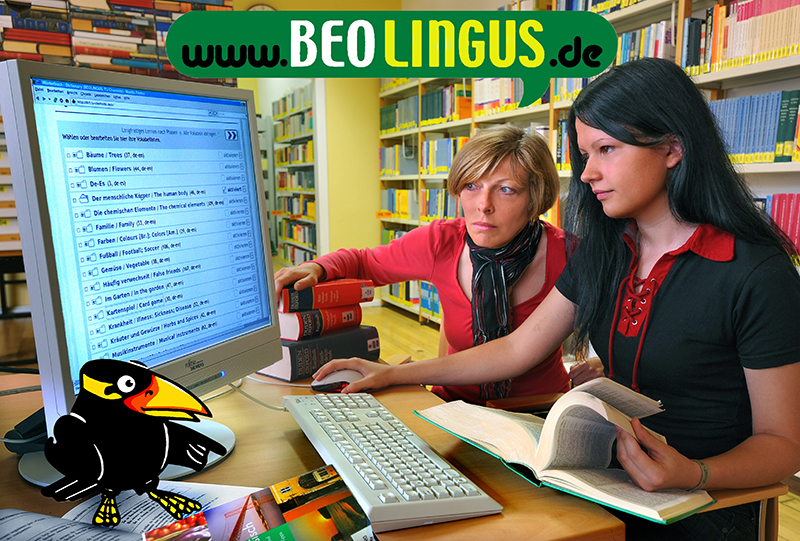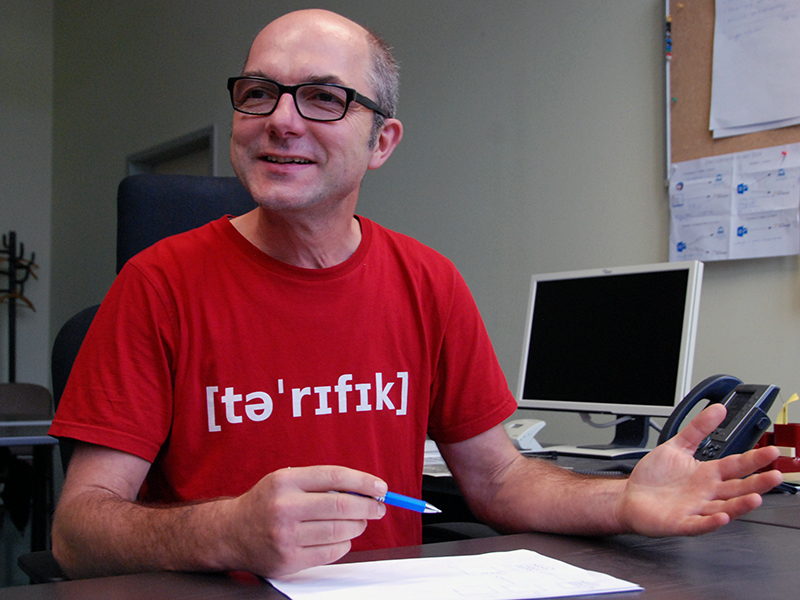Happy Birthday, BEOLINGUS!
It grows and grows and grows: The online dictionary of the Technische Universität Chemnitz is celebrating its 20th anniversary, and sends its thanks to millions of users
-

In the past years, Diana Lohse (right), who studied English and American Studies at the TUC, and Beate Otto, a freelance translator in Chemnitz, have also supported the Beolingus in creating vocabulary lists and continue to implement user suggestions. Photo: Press Office Photo Archive/Wolfgang Thieme -

Frank Richter is the spiritual father of the Beolingus and has filled the online dictionary with vocabulary over the last two decades. Photo: Mario Steinebach
2015 is a very special year for Frank Richter. Alongside his work at the University Computer Centre, Richter also manages the BEOLINGUS – an online dictionary of the Technische Universität Chemnitz – as a founder. This university translation platform is celebrating its 20th anniversary. Meanwhile, Richter and his team take a look back through the years at how the dictionary has grown considerably in size and new features since its creation.
600,000 hits per day
The foundation was laid when a word list was made freely available on the internet, consisting of approximately 120,000 German-English word pairs, intended to serve as a personal translation aid. In 1995, it was published as a search form to the web server of the TU Chemnitz, in order to experiment with special web techniques. ”I wanted to push the limits of the young WWW back then, and offer users valuable interactive content “, summarises Richter. The offering succeeded to awaken the interest of the Internet users that, from then on, sent in many corrections and new translations via email, and later by means of a web form. In 1996 came the systematic processing of the vocabulary: mistakes were fixed, vocabulary was unified and a grammatical classification of words was made. The web interface of the dictionary has been continuously improved according to Richter’s and users’ wishes. It was a worthwhile initiative, since translation requests increased from a few dozen up to more than 600,000 hits per day. ”It was my most intense hobby“, Frank says of the time, during which he devoted his free time to programming and cultivating the vocabulary of the translation platform. By 2006, the online dictionary had already grown in size to include more than 300,000 available translations.
Several Million Example Sentences
That same year, a collaboration with MIOTU/MIO2 Solutions GmbH began and a new name was born: BEOLINGUS. Alongside the Latin root word “lingua“, which is loosely translated as “language“, there is also a new symbol of the web-dictionary which gives information about the origin of the name. The black-feathered bird “Beo“ from the starling family borrows its name from the Indonesian word “blabbermouth”. This bird is considered extremely communicative and is known for its imitation of sounds and words. He figuratively ushered in a new portal design and many new features to the digital reference book. Henceforth, users are able to listen to native speakers’ pronunciation of particular words, see explanations of English words and find synonyms, quotes, examples sentences and lists on specialized topics from Anatomy to Zoology. In 2007, the dictionary was extended to include translation options in German-Spanish and in 2008, German-Portuguese. In 2009, the BEOLINGUS team integrated a vocabulary builder to facilitate the user’s learning of foreign words. Since 2012, users can access the Multilingual Translation Memory of the European Union, which allows them to find appropriate usage of terms based on several million example sentences from EU legislation. Finally, in 2011 the nonprofit organization IBS GmbH Sachsen, headed by Prof. Dr. Wolfram Hardt, took over the coordinating work of the BEOLINGUS.
814,000 translation pairs in three languages
These days, the web service registers between 500,000 to 600,000 daily translations by Internet users. At peak times, there were over a million translations per day. The German-English translations are still in the biggest demand. ”Here we receive from our users the most information about errors, new translation suggestions and requests, for which we are very grateful“, says Frank Richter. In his free time, Richter himself includes about 1,000 new modifications per month. In addition, one of the staff members adds the most requested words for which there is still no translation available. Currently, the BEOLINGUS dictionary offers over 650,000 German-English, 120,000 German-Spanish and 44,000 German-Portuguese word translations. ”We put a lot of value on the translation context. We don’t just give 1:1 word translations, which leaves the person to decide along what the best translation is“, Richter says, explaining what differentiates BEOLINGUS from other online dictionaries. ”BEOLINGUS provides in many cases the corresponding subject areas, applications and sample sentences and grammatical forms“, added Richter. An additional feature is that the German-English vocabulary is licensed under the GNU Public License. This license allows the vocabulary to be used for other projects. There are already several apps for smartphones that make the BEOLINGUS vocabulary translations available even without an Internet connection.
The BEOLINGUS team dedicates themselves to new tasks in the future. ”Web technology is short-lived – we are working on a new design which should make the many functions of BEOLINGUS more accessible“, said Richter. Likewise, in the future the order of search results will be optimized. In contrast, the vocabulary trainer will contain some fun new elements that will make learning more interesting. With the support of many online users, Frank Richter and his team want to remain true to their aims of continuously expanding vocabulary, pronunciation, learning functions, and adding new languages in the years to come.
Further information at www.beolingus.de or from Frank Richter, Phone +49 371 531-31879, Email frank.richter@hrz.tu-chemnitz.de.
(Author: Andy Schäfer, Translation: Nataliia Boiko and Sarah Wilson)
Mario Steinebach
08.06.2015




